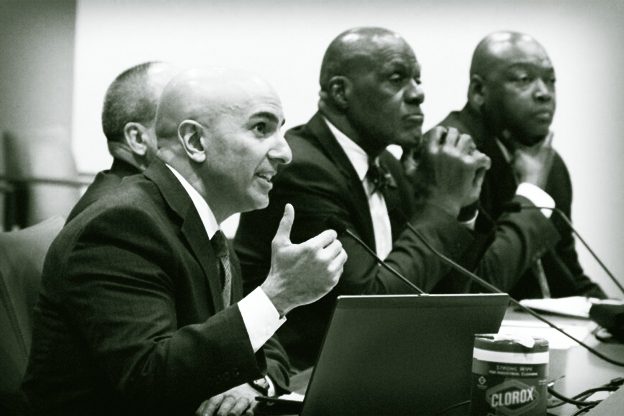
Strolling through the garden of logical fallacies – I
Four (4) lawyers from the Greenberg Traurig corporate law firm penned a Counterpoint, published on April 8th, to the Commentary that I wrote, critical of the so-called “Page Amendment,” which was published in the Minnesota Reformer on March 28th. There are several assertions in the Counterpoint that I would like to contest.
First, though, I’d like to observe that some of the parties who are touted in the counterpoint as endorsing the amendment are among the biggest public school detractors extant. From the penultimate paragraph, we learn that the Minnesota Business Partnership, Great Minnesota Schools, Ed Allies, Teach for America (the group that places unlicensed teachers into inner city public schools after a six week boot camp), and the Minneapolis Federal Reserve all endorse the Page Amendment.
Swell.
Great Minnesota Schools and Ed Allies are two AstroTurf fronts for the Minneapolis Foundation. Another Minneapolis Foundation created non-profit, Minnesota Comeback, which was later folded into Great Minnesota Schools, promised the Minneapolis School District over half a million dollars in 2016, but then reneged on the promise. And the Fed is headed by Neel Kashkari, who ran an explicitly anti-public school campaign as an unsuccessful Republican candidate for governor of California: the “asset manager from Laguna Beach” as the press called him.
These are all clearly public school champions. (That was sarcasm, in case you couldn’t tell.)
I made three principal points in my original commentary: 1) the Page Amendment would destroy the mandate to the state to create, maintain, and fund a statewide system of education, 2) it would destroy the standing of school districts to sue the state for a violation of the Education Clause, and 3) the sketchy reference, in the Senate version of the Page Amendment, especially, to other forms of education as legitimate alternatives to public schools offers an invitation to a court to order funding for private, religious, or home school for a violation of the amendment. And never mind the Page Amendment’s complete reliance on test scores as a measurement of school quality.
– o O o –
The counterpoint kicks off with this quote from Alan Page:
“A quality education is without question the most powerful tool we have to break the cycle of poverty and create a society in which everyone can fully participate. It doesn’t just change one child’s life. It has the potential to improve the future for generations to come.”
Everything about the Page Amendment: its ethos, its language, and its advocacy flow from this statement. Even its supporters would agree with that. Unfortunately, it isn’t the truth, the whole truth and nothing but the truth.
If the premise of the Page Amendment is faulty, the conclusions reached by arguments on its behalf are also faulty.
Educational outcomes are a trailing indicator of the equitable health of a society, a point that I will elaborate on in later installments.
As I have pointed out on multiple occasions, the Education Clause and Skeen v. Minnesota, and Cruz-Guzman v. Minnesota, too, already mandate a quality education. The problem isn’t the Constitution; it’s the will of the Minnesota Legislature, as we are seeing played out even as I write this.
Destroying the language that creates the constitutional mandate to maintain and fund a state-wide system of education is not the answer. It is the obverse of the answer, especially if you are trying to “improve the future for generations to come.” Whenever I read that phrase, it’s Buzz Lightyear who reads it back to me.
Seriously, to do anything approaching that grand, you need a system, a public system of education. One that is properly funded and integrated and is not hobbled by segregated charter schools which are unconstitutionally exempt from integration mandates and which siphon off enormous amounts of money to privately-run enterprises.
If you think the education system is flawed, the answer is emphatically not to burn it down and replace it with . . . nothing. That’s the nihilist’s answer.
There is no other place in the Minnesota Constitution that requires the state to create, maintain, and fund a general system of education. The founders of Minnesota, and many other states, recognized that a universal free education is the backbone of a state’s democracy. It says so right in the Education Clause. It was true then, and by God, it’s true now.
The authors of the counterpoint assert, without proof, that the Education Clause is obsolete. It’s not obsolete; it’s one of the smartest things that the state’s founders ever wrote.
They also assert that the amendment would somehow close the “education gap,” presumably through litigation. A staffer from the Fed opined, though, that there wouldn’t be more litigation because of the amendment.
Alan Page, the author of the Page Amendment, according to the counterpoint authors (which, frankly, I have trouble believing because it is so bad) said, when pressed (by a bunch of high school kids in Rochester) on the issue of the duty to fund education under the amendment, that the duty to fund education is “implied.” I truly cannot believe that I must explain this to anybody, much less a former member of our Supreme Court, that if you take a duty of government out of the constitution by amendment, it doesn’t effing exist anymore. It doesn’t continue along as some kind of fond memory, a pleasant aftertaste.
– o O o –
I have a lot more to say about the naked assertions and embarrassing sloganeering of the counterpoint, but it’ll have to wait for future installments.
Thanks for your feedback. If we like what you have to say, it may appear in a future post of reader reactions.


